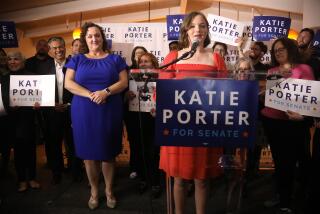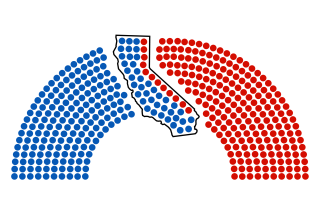Inland Empire GOP Rep. Gary Miller won’t seek reelection
WASHINGTON — Facing one of the toughest campaigns of any Republican congressman in the country, Rep. Gary Miller announced Wednesday that he would not seek reelection to his Inland Empire seat, increasing prospects for a Democratic pickup.
“While there is still a lot of work to be done, it is now time for me to pass the baton. I will not seek reelection to Congress at the end of this term,” Miller said in a statement.
His decision sets up a competitive race among at least four Democrats — including an attempted comeback by former Rep. Joe Baca — in a district President Obama won by a wide margin.
Miller, 65, becomes the fifth California congressman to head for the exits, further shaking up a once-stable delegation. Democrats Henry A. Waxman of Beverly Hills and George Miller of Martinez and Republicans Howard “Buck” McKeon of Santa Clarita and John Campbell of Irvine have announced they are retiring when their terms end.
Miller, elected to the House in 1998, was a top Democratic target in a district stretching west from Redlands and San Bernardino to Upland and Rancho Cucamonga. Democrats hold a registration edge over Republicans, 41% to 34%. And with Latinos making up nearly half the district, Miller’s conservative record on immigration was viewed as a further handicap.
“Well, we can say this about Gary Miller: He sure can read the writing on the wall,” said Andy Stone, communications director of the House Majority PAC, which is working to elect a Democratic majority in the House.
Democrats need 17 seats to take over the House, a prospect that seems exceedingly dim, but Republicans have to protect several vulnerable members who may benefit from Miller’s departure.
“That’s probably not a priority seat for Republicans anymore,” said Jon Fleischman, a former state Republican official who publishes a conservative blog. He said Miller’s decision would shift Republican money to more competitive races.
Democrats running for the seat include Redlands Mayor Pete Aguilar, who has received support from the House Democrats’ campaign arm; Colton attorney Eloise Gomez Reyes, who is backed by Emily’s List, a national organization that helps elect Democratic women; and San Bernardino school board member Danny Tillman.
Baca, who was defeated in 2012 in a neighboring district, said he also was running.
“Maybe this will help me get back there,” he said Wednesday. Although Baca trailed Aguilar and Reyes in fundraising, according to recent reports, he is highlighting the seniority he would enjoy if returned to Congress.
Filing for the June 3 primary is open until March 12 in races without an incumbent.
UC Riverside political scientist Shaun Bowler said the House GOP’s failure to act on immigration could have hurt Miller.
The intraparty fighting between tea party elements and more mainstream conservatives makes it “no longer fun to be a congressman, even if you are in the majority” in Congress, he said.
Bowler doubted that Miller, a conservative Republican, could have won in the increasingly Democratic district, but his decision to bow out well before the election may be a reflection of the GOP’s problems in California, including falling registration and difficulty recruiting good candidates.
Allan Hoffenblum, a former GOP strategist who publishes the nonpartisan California Target Book, said he “would not be surprised if no viable Republican gets in” the race.
In spite of the district’s Democratic tilt, Miller won reelection in 2012 under the state’s top-two primary system, in which the two highest finishers advance to the general election, regardless of their party. He defeated a Republican that November after four Democrats split their party’s vote and failed to survive the primary.
“Had Gary Miller been on the ballot against a Democrat in 2012, he wouldn’t be talking about retiring now because he would already be retired,” Fleischman said.
Miller, a wealthy land developer and former Diamond Bar mayor and state assemblyman, said “family circumstances” led to his decision.
“When I came to Congress in 1999, my children were grown and out of the house,” he said. “Today, we have a full house again. My wife and I are raising our three grandchildren.”
More to Read
Start your day right
Sign up for Essential California for news, features and recommendations from the L.A. Times and beyond in your inbox six days a week.
You may occasionally receive promotional content from the Los Angeles Times.








